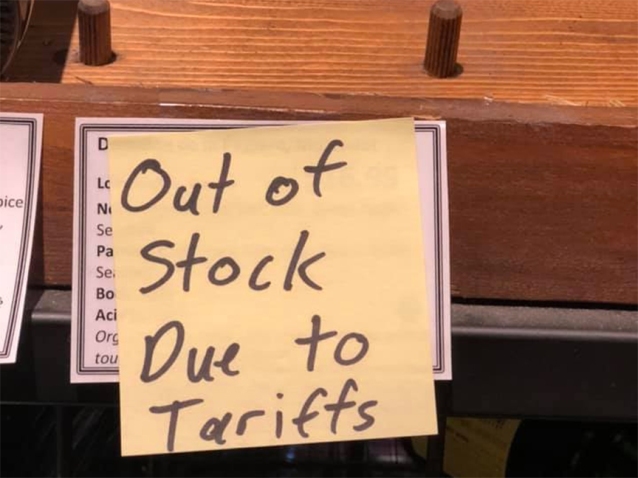 Above: small businesses like Blue Streak Wines & Spirits in New York City are having trouble restocking European wines because of tariffs imposed last year says Rob Bralow, a wine buyer there.
Above: small businesses like Blue Streak Wines & Spirits in New York City are having trouble restocking European wines because of tariffs imposed last year says Rob Bralow, a wine buyer there.
“Not sure who else is feeling this,” wrote New York-based wine buyer Rob Bralow on Facebook yesterday. “But it’s now at the retail level where I’m having a hard time finding stock to put on my shelves in NYC. This is the third wine in the last two days that I was told stock is not expected in for at least a month if not more. Everything from France is in a holding pattern. I’m expecting many others European wines to begin to be hard to stock as well.”
He was referring to what has been called “a logjam of activity from Europe to the U.S.” caused by the 25 percent wine tariffs imposed by the U.S. starting in October of last year.
Orders from the U.S. have been on hold as importers fear that new and possibly higher tariffs will implemented while their “wine is on the water,” as they say in trade parlance. Importers are forced to pay the duty on the products they ship even if the orders are places before the duties are put into effect.
The New York retailer’s words were echoed in an article published yesterday in the business section of the Austin American-Statesman, “Trump threat could make it harder to get your favorite wine in Austin.”
But John Roenigk, the owner of the Austin Wine Merchant, a legacy wine retailer in the state’s capital, is also facing another issue: the increased price of wines, due to the October tariffs, is drastically impacting sales in his shop.
“The disappointment on the faces of our clients for these wines was palpable,” he told the reporter for the city’s paper of record. “Some bought the wines anyway. Some took less than they would have. Others declined altogether. We still have wine from this producer months later when the wines are normally sold out in advance of arrival.”
(Full disclosure: John Roenigk and Nat Davis, the other wine professional quoted in the Austin American-Statesman piece, are both good friends of mine.)
Anecdotally, I’m hearing reports from across the U.S. that distributors are seeing sharp drops in sales because of the price increase for French and Spanish wines, especially in the “by the glass” category (under $15 retail) where the higher pricing puts them out of reach for many restaurant wine programs.
The U.S. Trade Representative has given no clear indication of when the tariffs will be lifted or what it will take to resolve the U.S.-European Union trade war. But most industry observers expect the 25 percent tariffs to remain active until 2021. And there’s no guarantee that the tariffs won’t be increased or expanded to other countries like Italy, which has remained outside of the wine duties’ reach so far (although cheeses like Parmigiano Reggiano and Pecorino have subject to 25 percent tariffs since October).
As the immediate impact of the tariffs is starting to come into sharp focus, many trade members speculate that the long-term affects of the trade war could be devastating for the U.S. wine trade. Many small businesses like those above won’t be able to weather the increased pricing and its fallout.
See this excellent post on the popular trade-focused wine blog SevenFifty, “How to Stay Informed About Tariffs and How to Take Action.”

Pingback: Terroirist: A Daily Wine Blog » Daily Wine News: Next in Natural
Why not address the obvious? Will wine drinkers decrease their consumption of wine or replace the French/Spanish/German wines with American wines? Or wines from Chile, etc. Won’t that help the American wine industry which currently has over supply? Don’t your two friends have an opinion on that? Can’t those wine shops make money selling American wine? The purpose of the 25% tariff is to get the EU to stop providing illegal subsidies to Airbus. So far the EU has refused to respond to the WTO findings.
Bruce, thanks for sharing your opinion and insight here.
From what I’ve been seeing, Chilean and New Zealand wines are starting to fill the by-the-glass pours that the French are losing. American wines are mostly too expensive to fill those spots.
Pingback: Liquor Industry News 02-24-20 | Franklin Liquors